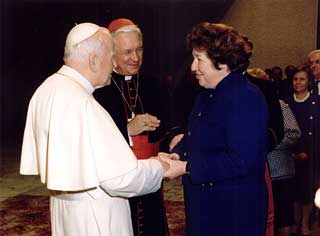News Release: MCC Mourns Passing of Sr. Monica Kostielney, R.S.M.
Former CEO Exemplified Excellence and Service During Four Decade Career of Public Policy Advocacy

FOR IMMEDIATE RELEASE
April 29, 2025
(Lansing, Mich.) — Michigan Catholic Conference (MCC) announced with mourning today that Sister Monica Kostielney, R.S.M., former president and CEO of the organization, died on Monday, April 28th at the age of 87.
Sister Monica’s career with MCC spanned four decades, beginning in 1972 as a volunteer on a statewide ballot campaign and continued through to her appointment in 1994 as president and CEO, a position she held until her retirement in 2010. Sister Monica became the first female in the country to lead a state Catholic conference, and soon thereafter the first woman to chair the National Association of State Catholic Conference Directors. Her career included several gubernatorial appointments, numerous board positions, lifetime achievement awards, and countless friends and colleagues in Michigan and across the country.
“Sister Monica was filled with a deep love for every human person, which was evidenced by her interactions with others, her advocacy work, and her tenured leadership of MCC,” said Paul A. Long, president and CEO of MCC, who succeeded Sister Monica in 2010. “She was among the most consequential women, and indeed individuals, in the Capitol community and the Church during her thirty-eight years with MCC.”
A professed Religious Sister of Mercy from Detroit who prior to joining MCC served as a teacher in the Grand Rapids area, Sister Monica dedicated herself to public policy issues that were at the forefront of society and the interests of the Catholic Church, including the protection of human life at all stages, supporting the dignity of the poor and vulnerable of the state, and promoting justice and choice in state and federal education policy.
Among Sister Monica’s most impactful accomplishments was her role in the defeat of a ballot proposal to legalize assisted suicide in Michigan in 1998. Through her leadership a coalition of organizations was created to campaign against the ballot initiative and an award-winning statewide education campaign was developed to engage and mobilize Catholics against the issue, which was soundly defeated by Michigan voters.
Other policy achievements in which Sister Monica played an instrumental role were MCC’s support of legislation signed by Republican Governor John Engler that implemented the first and most comprehensive state ban on human cloning in the country, as well as legislation signed by Democratic Governor Jim Blanchard requiring school districts to provide transportation to nonpublic school students to off-site auxiliary service classes.
Not only was she known by nearly everyone in the Capitol community, Sister Monica was also revered and respected, forming lasting relationships with policymakers, elected officials and prominent individuals from varying backgrounds and both political parties, regardless of the complexity or significance of an issue. She served on over two dozen boards of directors and was appointed to several influential positions by both Republican and Democratic governors, including Governor Blanchard’s Blue Ribbon Welfare Reform Committee, Governor Engler’s Michigan Education Trust Challenge Fund Board of Directors, and Governor Jennifer Granholm’s Emergency Financial Advisory Panel.
Sister Monica was happy to engage with others in her love for books, art, paintings and sculptures, particularly those that depicted the depth of life and the soul of humanity. Her kind, gentle, and engaging personality, together with her ability to connect with and be comfortable around anyone regardless of their standing in life, earned her tremendous respect around the Capitol and throughout the Catholic Church in Michigan and across the United States.
Among her most significant recognitions include the Holy Cross Pro-Ecclesia et Pontifice medal from Pope Benedict XVI in 2010 for her service to the Church, as well as the Lifetime Achievement Award from Right to Life of Michigan in 1998 for her instrumental work in defeating the assisted suicide proposal.
“She was deeply passionate about the Church’s role in public life, especially as a means of advocacy for the well-being of the least fortunate, the unborn, the elderly, and those seeking educational justice,” Long said. “Of course, her love of Jesus and His Blessed Mother were her greatest passion and love and inspired her years of dedicated service to the bishops of this state advocating for the common good. She will be missed and always remembered. May God give rest to her beautiful soul.”
Following retirement Sister Monica moved to Chicago, Illinois, where she spent her days living with joy and faith in community with her religious sisters. She is preceded in death by her parents Helen (Matyniak) and Walter Kostielney in 1998 and is survived by her sister Mary (Stephen) Matthews of Kenosha, Wisconsin; her nephew Jacob (Joy) Matthews, of Sun Prairie Wisconsin; her niece Stephanie (Jonathan) Parker of Bradford-on-Avon England; and great-nephews and great-nieces Brendan and Liam Matthews and Oona and Rowen Parker.
Note: An online tribute developed by MCC staff to honor the life and legacy of Sister Monica Kostielney, R.S.M. is present at micatholic.org/SisterMonica.
Michigan Catholic Conference is the official public policy voice of the Catholic Church in this state.
-- 30 --
